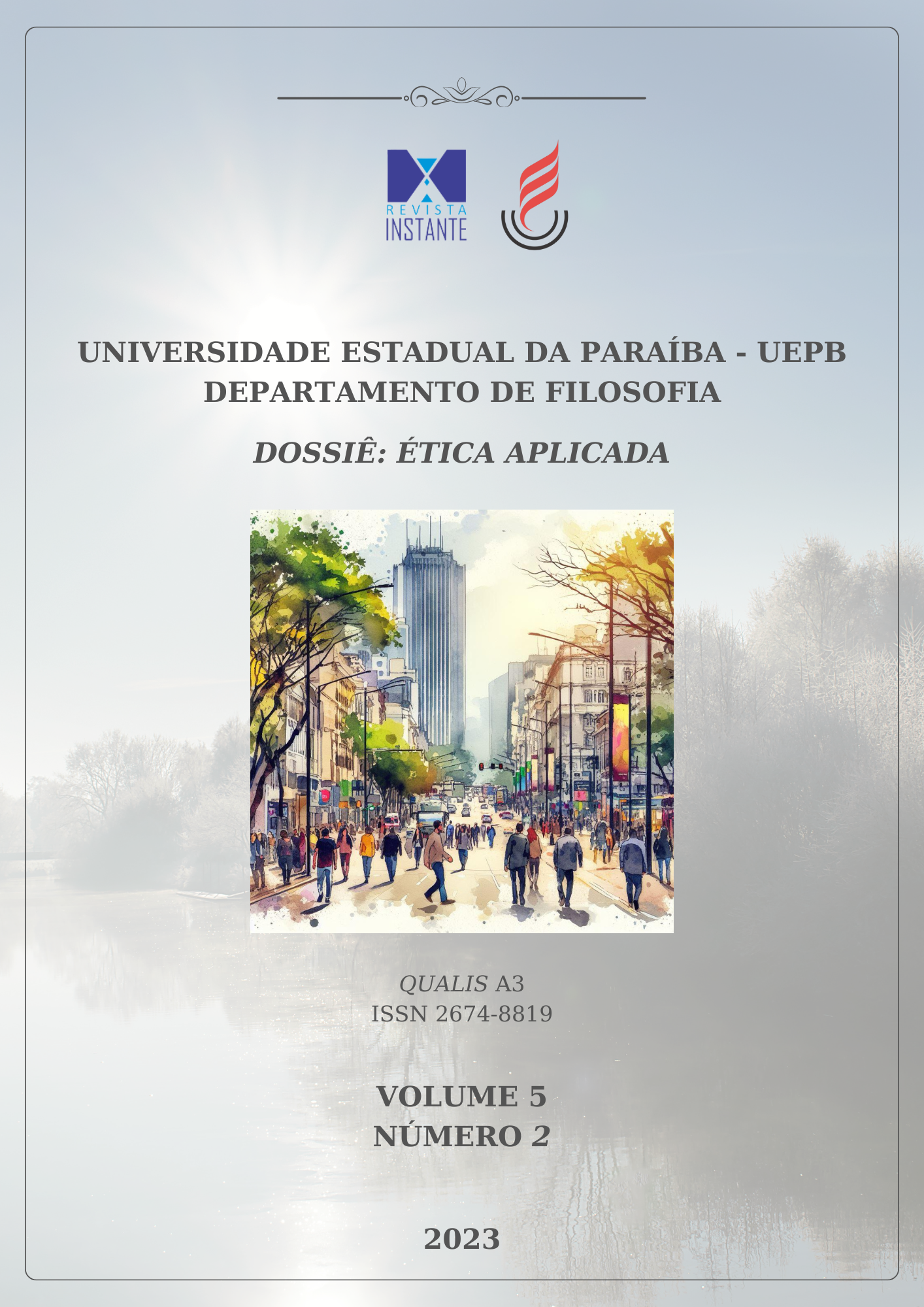As EMOÇÕES COMO O MOTUS DAS AÇÕES MORAIS EM RELAÇÃO AO MEIO AMBIENTE
Palavras-chave:
Compaixão. Empatia. Ética Ambiental.Resumo
Esse artigo tem por objetivo argumentar em favor da hipótese de que as emoções, mais especificamente a empatia e a compaixão, são elementos fundamentais nas tomadas de decisão e ações em relação ao meio ambiente. Elas são essenciais por possibilitarem uma aproximação da natureza, derrogando, assim, o distanciamento histórico antrópico, bem como por favorecer a emersão de um sentimento de pertença ambiental. Tanto o sentimento de aproximação como o de pertencimento são importantes para ações morais baseadas em uma ética ambiental ecocêntrica, visto que a visão antropocêntrica presente nas éticas tradicionais tem levado o ser humano a praticar ações que possuem consequências degradantes e destrutivas no cômputo global e, principalmente, para o equilíbrio dos ecossistemas e de toda a biosfera. Diante disso, urgem reflexões buscando encontrar novos paradigmas relacionais que evidenciem o valor intrínseco do meio ambiente.
Referências
ABRANTES, Pedro. De como escrevemos a vida e a vida se inscreve em nós: um estudo da socialização através da análise de autobiografias. Educação e Sociedade, Campinas, v. 35, n. 126, p. 111-127. 2014.
ADORNO, Theodor W. Teoria Estética. [Ästhethische Theorie.] Tradução de Artur Morão. Martins Fontes, São Paulo, 1982.
ALVAREZ, Maria. Reasons for Action: Justification, Motivation, Explanation. In: The Stanford Encyclopedia of Philosophy. Edited by: Edward Zalta. Winter 2016 Edition, 2016. Disponível em: https://plato.stanford.edu/archives/win2016/entries/reasons-just-vs-expl/. Acesso em: 18 de novembro de 2022.
BATSON, Charles D. The altruism question: Toward a social-psychological answer. Hillsdale, NI: Erlbaum, 1991.
BEDFORD, E. Emotions. Proceedings of the Aristotelian Society, v. 57, p. 281-304. 1957.
BEN-ZE’EV, Aaron. The Thing Called Emotion. In: The Oxford Handbook of Philosophy of Emotion. Edited by: Peter Goldie, Oxford University Press, 2010. p. 41-61.
BERENGUER, J. The effect of empathy in environmental moral reasoning. Environment and Behavior, 42, p. 110-134. 2010.
BREYER, Thiemo. Empathy, sympathy and compassion. In: The routledge handbook of phenomenology of emotion. Edited by: Thomas Szanto; Hilge Landweer, 2020. p. 429-440.
BOOCK, Max Alexandria. Emotion in Science: The Need for Compassion in Wildlife Conservation. WWU Honors Program Senior Projects. 2020, p. 366. Disponível emhttps://cedar.wwu.edu/wwu_honors/366. Acesso em: 18 de novembro de 2022.
BUDOLFSON, Mark Bryant. Consumer Ethics, Harm Footprints, and the Empirical Dimensions of Food Choices. In: The Oxford Handbook of Food Ethics. Edited by: Chignell, et al., 2016: p. 163-181. Disponível em:
https://www.academia.edu/43690692/Consumer_Ethics_Harm_Footprints_and_the_Empirical_Dimensions_of_Food_Choices. Acesso em: 20 de novembro de 2022.
COSTA, Cláudio F. Três níveis de ação. Ethic@. Florianópolis, v. 4, n.1, p. 83-93. 2005.
DAVIS, Mark H. Measuring individual differences in empathy: Evidence for a multidimensional approach. Journal of Personality and Social Psychology, v. 44, n. 1, p. 113-126. 1983.
DEONNA, Julian; TERONI, Fabrice. The Emotions. A Philosophical Introduction. London/New York: Routledge, 2012.
DEONNA, Julian; TERONI, Fabrice. Emotions as attitudes. Dialectica, v. 69, n. 3, p. 293-311. 2015.
DE SOUSA, Ronald. Emotion, The Stanford Encyclopedia of Philosophy (Spring 2013 Edition), Edward N. Zalta (ed.). Disponível em https://plato.stanford.edu/archives/spr2013/entries/emotion/. Acesso em: 20 de novembro de 2022.
DE SOUSA, Ronald. Emotions, Education and Time. Metaphilosophy, 21: p. 434-446. 1990.
DE SOUSA, Ronald. The Rationality of Emotion, Cambridge, MA: MIT Press, 1987.
FAO. Livestock’s Long Shadow: Environmental Issues and Options, Rome: Food and Agriculture Organization of the United Nations, 2006. Disponível em: https://www.fao.org/3/a0701e/a0701e00.htm. Acesso em: 22 de novembro de 2022.
GILLIGAN, Carol. In a Different Voice. Cambridge: Harvard University Press, 1982.
GRIFFITHS, Paul E. What Emotions Really Are: The Problem of Psychological Categories. Chicago: University of Chicago Press, 1997.
GUTSELL, J. N.; INZLICHT, M. A neuroaffective perspective on why people fail to live a sustainable lifestyle. In H. van Trijp (Ed.), Multiple selves: Angels, demons, and sustainable behavior. London: Psychology Press, 2010.
HORKHEIMER, Max; ADORNO, Theodor W. Dialética do Esclarecimento: Fragmentos filosóficos. Trad.: Guido Antônio de Almeida. Rio de Janeiro: Jorge Zahar, 1997.
HUME, David (1711-1776). Tratado da natureza humana: uma tentativa de introduzir o método experimental de raciocínio nos assuntos morais. Tradução de Débora Danowski. 2. ed. rev. e ampliada. São Paulo: Editora UNESP, 2009.
JAGGER, Alison M. Feminist Ethics. In: Encyclopedia of Ethics. Edited by: Becker, L. New York: Garland, 1992. p. 364-367.
JAMES, William. What is an Emotion? Mind, v. 9, p. 188-205, 1884.
JAMES, William. The Principles of Psychology. New York: Dover, 1890/1950.
LERNER, Jennifer; LI, Ye; VALDESOLO, Piercarlo; KASSAM, Karim. Emotion and Decision Making. Annu. Rev. Psychol. 66: In press. 2015.
MONTANARELLA, Luca. Trends in Land Degradation in Europe. In: Climate and Land Degradation. Edited by: Sivakumar, Mannava V.K.; Ndiang’ui, Ndegwa. Series: Environmental Science and Engineering. Berlin Heidelberg: Springer-Verlag, 2007. p. 106 -132.
NAESS, Arnie. The shallow and the deep, long-range ecology movements: a summary. In: Sessions, George op. cit. Publicado originalmente em Inquiry (Oslo), v. 6, 1973.
NUSSBAUM, M. Emotions as Judgments of Value and Importance. In: Thinking about feeling: Contemporary philosophers on emotions. Edited by: R. C. Solomon, Oxford University Press, 2004. p. 183-199.
PALMER, Clare; MACSHANE, Katie; SANDLER, Ronald. Environmental Ethics. Annual Review of Environment Resources. v.39, p. 419-442. 2014.
PLUMWOOD, Val. Nature, self and gender: feminism, environmental philosophy and the critique of rationalism. Hypatia, v. 6, n. 1, p. 3-27. 1991.
PRINZ, Jesse. The Emotional Construction of Morals, Oxford; New York: Oxford University Press, 2007.
SCHOPENHAUER, Arthur. Sobre o fundamento da moral. Trad.: Maria Lúcia Cacciola. São Paulo: Martins Fontes, 1995.
SCARANTINO, Andrea; DE SOUSA, Ronald. Emotion In: The Stanford Encyclopedia of Philosophy (Summer 2021 Edition), Edited by: Edward N. Zalta. Disponível em: https://plato.stanford.edu/archives/sum2021/entries/emotion/. Acesso em: 18 de novembro de 2022.
SCARANTINO, Andrea. The Motivational Theory of Emotions. In: Justin D’Arms Andy; Daniel Jacobson (eds.), Moral Psychology and Human Agency, Oxford: Oxford University Press, 2014. p. 156-185.
SCARANTINO, Andrea. Basic Emotions, Psychological Construction and the Problem of Variability, In: Barrett and Russell 2015: p. 334-376. 2015.
SCHULTZ, P. W. Empathizing with nature: The effects of perspective taking on concern for environmental issues. Journal of Social Issues, 56, p. 391-406. 2000.
SHELTON, M. L.; ROGERS, R. W. Fear-arousing and empathy-arousing appeals to help: The pathos of persuasion. Journal of Applied Social Psychology, 11, p. 366-378. 1981.
SOBEL, David. Beyond ecophobia. Great Barrington, MA: Orion Society, 1996.
SOLOMON, Robert C. The Passions, Garden City, New York: Doubleday Anchor, 1976.
SOLOMON, Robert C. What is an Emotion? Classic and Contemporary Readings, Oxford; New York: Oxford University Press, 2003.
TAM, Kim-Pong. Dispositional empathy with nature. Journal of Environmental Psychology, 35, p. 92-104. 2013.
TAPPOLET, Christine. Émotions et valeurs, Presses Universitaires de France, França, 2000.
TAPPOLET, Christine. Emotions and the Inelligibility of Akratic Action, In: Weakness of Will and Practical Irrationality, Edited by: Sarah Stroud; Christine Tappolet, New York: Oxford University Press, 2003, p. 97-120.
TAPPOLET, Christine. Emotions, Values and Agency. New York: Oxford University Press, 2016.
TELES, Eugênia R. Sobre a determinação das emoções na resolução dos dilemas morais. 2017. Tese (Doutorado em Filosofia) – Programa Integrado de Doutorado em Filosofia das Universidades Federais da Paraíba (UFPB), de Pernambuco (UFPE) e do Rio Grande do Norte (UFRN), Universidade Federal da Paraíba. João Pessoa, 2017.
TELES, Eugênia R. Emoção versus Razão: a (ir)racionalidade das emoções em Lavoura Arcaica. Problemata - Revista Internacional de Filosofia. v. 11, n. 5, p. 106-128. 2020.
VIEIRA, Cláudia Sintra. Olhar(es) sobre a Compaixão. Dissertação (Mestrado em Psicologia Clínica e da Saúde) – Universidade de Coimbra, Coimbra, 2013. 88 f.
VOGEL, Steven. Against Nature: The Concept of Nature in Critical Theory, Albany: State University of New York Press, 1996.
WOLLHEIM, Richard. On the Emotions. New Haven, CT: Yale University Press, 1999.










